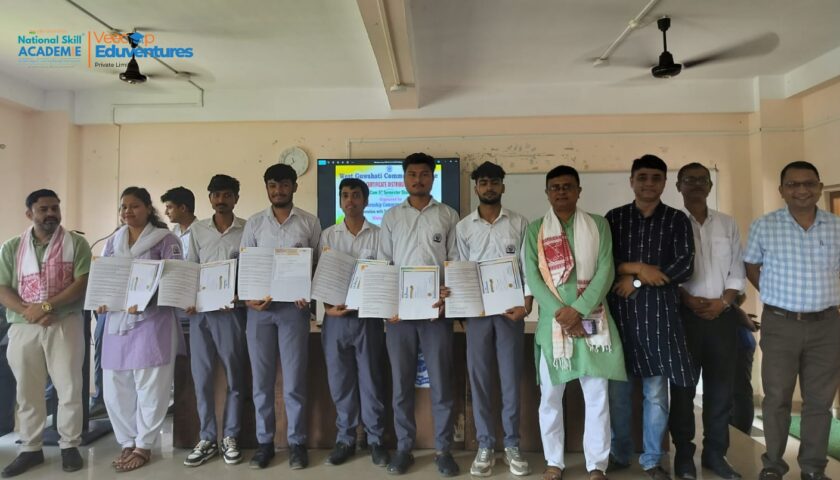Veecap Eduventures Private Limited, based at the Research Park of IIT Guwahati, has launched a structured internship program aimed at addressing one of the most persistent challenges in India’s higher education ecosystem: the gap between academic training and actual employability.
The initiative, which combines ICT training, corporate job simulations, and employability workshops, reflects a growing recognition that degrees alone are no longer sufficient to secure meaningful employment in an increasingly competitive job market. With unemployment among educated youth often linked to a mismatch between skills and industry expectations, programs like this are seen as critical interventions.
A Three-Phase Structure for Holistic Learning
The internship has been designed as a 120-hour journey, broken into three distinct but interlinked phases.
Phase One: ICT Skills Training
The first stage focuses on Information and Communication Technology (ICT) skills, delivered through IIT Bombay’s well-regarded Spoken Tutorial program. This ensures that students begin by acquiring a strong grounding in digital tools and applications. According to Veecap Eduventures, these ICT skills are considered essential for both academic advancement and professional adaptability in fields ranging from engineering to business management.
Phase Two: Job Simulations from Global Companies
In the second stage, students participate in simulated industry tasks designed by international organizations such as Accenture and Citibank. These simulations mimic real corporate challenges, from data analysis to client interaction scenarios, allowing students to experience the expectations and pace of the corporate environment without leaving the classroom. Educators believe this step is particularly valuable in bridging the divide between theoretical knowledge and the practical problem-solving required in today’s workplace.
Phase Three: Employability and Entrepreneurship Workshop
The final stage emphasizes career readiness and entrepreneurial thinking. Students undergo workshops that build communication, teamwork, leadership, and innovation skills. At the same time, entrepreneurship training encourages participants to think beyond traditional career paths, with an eye toward creating their own ventures and generating employment for others.
Beyond Training: A Job Portal for Visibility
What distinguishes this initiative from conventional internship programs is its follow-through mechanism. Alongside training, Veecap Eduventures has introduced a dedicated job portal named InternLakshya.
Through this platform, each participating student’s portfolio is digitized and made accessible to potential recruiters. The system allows companies to search for fresh talent based on demonstrated skills and project outcomes rather than relying solely on academic grades. For students, it provides a tangible showcase of their abilities, while for employers, it reduces the gap between scouting and hiring young professionals.
Addressing India’s Employability Challenge
The timing of the launch comes against the backdrop of repeated reports highlighting employability challenges in India. While millions graduate from universities each year, multiple surveys suggest that less than half are immediately employable in industry roles without further training.
By combining ICT literacy, exposure to global corporate practices, and career-focused workshops, Veecap Eduventures is attempting to create a balanced model that not only educates but also equips students for sustainable careers.
Education analysts point out that the emphasis on entrepreneurship is especially significant. In a country where job creation has not kept pace with the number of job seekers, fostering a mindset that values innovation and enterprise could help reduce the dependency on traditional employment channels.
Voices from Academia and Industry
Although the program has only recently been launched, early responses from academic observers have been positive. It has been observed that the structured design of the internship especially its integration of industry simulations gives students a significant advantage as they transit into professional roles, an initiative led by Veecap Eduventures in collaboration with the E-Cell of IIT Guwahati at the institute’s Research Park.
Industry leaders, too, have acknowledged the relevance of such initiatives. “The real test of graduates is not what they know from textbooks, but how quickly they can adapt to a company’s workflow,” a senior manager at an IT consultancy commented. “Programs like this help prepare them for that shift.”
Empowering Students for the Future
For students, the program represents more than just another training module. By giving them access to both skills and visibility, Veecap Eduventures is attempting to break the cycle in which young professionals struggle to gain their first meaningful work opportunity due to lack of experience.
The company’s representatives emphasize that the primary objective is not just to train students, but to make them genuinely employable. This distinction underlines the importance of blending technical, practical, and soft skills in a single framework.
A Model for Other Institutions?
Education reformers have long argued for closer collaboration between academia and industry. While many colleges have industry tie-ups for placements, structured internships that offer both training and a recruitment pipeline remain rare. Veecap Eduventures’ initiative could serve as a model for replication in other regions, particularly in Tier-2 and Tier-3 cities, where access to corporate training programs is often limited.
If successful, it could help redefine how internships are perceived in India from short-term stints focused on experience certificates to meaningful programs that act as stepping stones to long-term employability.
Conclusion
With its three-phased internship program and the launch of the InternLakshya portal, Veecap Eduventures has set out to bridge one of the most pressing gaps in India’s higher education landscape.
By grounding students in ICT, exposing them to real corporate practices, and encouraging both employability and entrepreneurship, the program offers a multi-dimensional approach to career readiness. As the initiative unfolds, it will be watched closely by both students and employers eager to see if such structured internships can make a tangible difference in reducing the employability gap in India.




